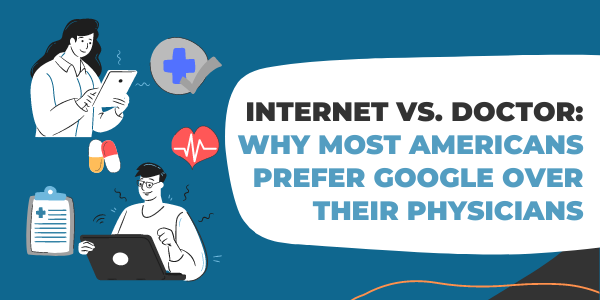The internet has revolutionized how people access information, and healthcare is no exception. Patients are increasingly turning to online resources to learn about their health. But how does this trend impact the patient-doctor relationship? Let’s explore the findings of a recent study by the American Health Information Management Association Foundation (AHIMA) and delve into the evolving dynamic between patients, doctors, and the internet.
Why Patients Turn to the Web
The AHIMA study highlights several reasons why patients seek health information online:
- Understanding Medical Information: Many patients find it challenging to grasp complex medical explanations during doctor visits. Online resources can provide explanations in simpler terms and allow patients to research at their own pace.
- Empowerment and Control: The internet empowers patients to take a more active role in their health. They can research symptoms, treatment options, and potential side effects before appointments.
- Finding Support Communities: Online platforms connect patients with individuals facing similar health concerns. This fosters a sense of community and shared experience.
Challenges of Online Health Information
While the internet offers valuable resources, it’s crucial to be aware of potential drawbacks:
- Accuracy and Credibility: Not all online health information is created equal. Patients need to critically evaluate sources and prioritize reputable websites from established medical institutions or government health agencies.
- Self-Diagnosis Can Be Misleading: Symptoms can vary across different conditions. Relying solely on online information for diagnosis can be misleading and delay proper medical care.
- Information Overload and Anxiety: The sheer volume of health information online can be overwhelming, leading to unnecessary anxiety or misinterpretations.
The Ideal Scenario: Collaboration is Key
The internet should complement, not replace, the patient-doctor relationship. Here’s how to achieve a productive balance:
- Utilize Online Resources as a Starting Point: Research online to gather preliminary information and prepare questions for your doctor.
- Discuss Your Online Research with Your Doctor: Share credible online resources you’ve found to enhance the consultation.
- Work collaboratively with your doctor to create a personalized treatment plan.
Bridging the Gap Between Patients and Doctors
The AHIMA study also identifies areas for improvement in the patient-doctor dynamic:
- Clearer Communication: Doctors can improve communication by using simpler language and offering patients more time to ask questions.
- Patient Engagement: Doctors can leverage online tools like patient portals to provide educational resources and facilitate communication between visits.
- Transparency and Trust: Building trust is essential. Doctors can address patient concerns about medical record security and ensure clear explanations of diagnoses and treatment options.
The Future of Patient Education
The internet has empowered patients to become more informed participants in their healthcare journey. By approaching online information with a critical eye and maintaining open communication with doctors, patients can leverage the web’s potential to optimize their health outcomes. Healthcare providers, in turn, can adapt by improving communication strategies and utilizing digital tools to enhance patient education and engagement.

